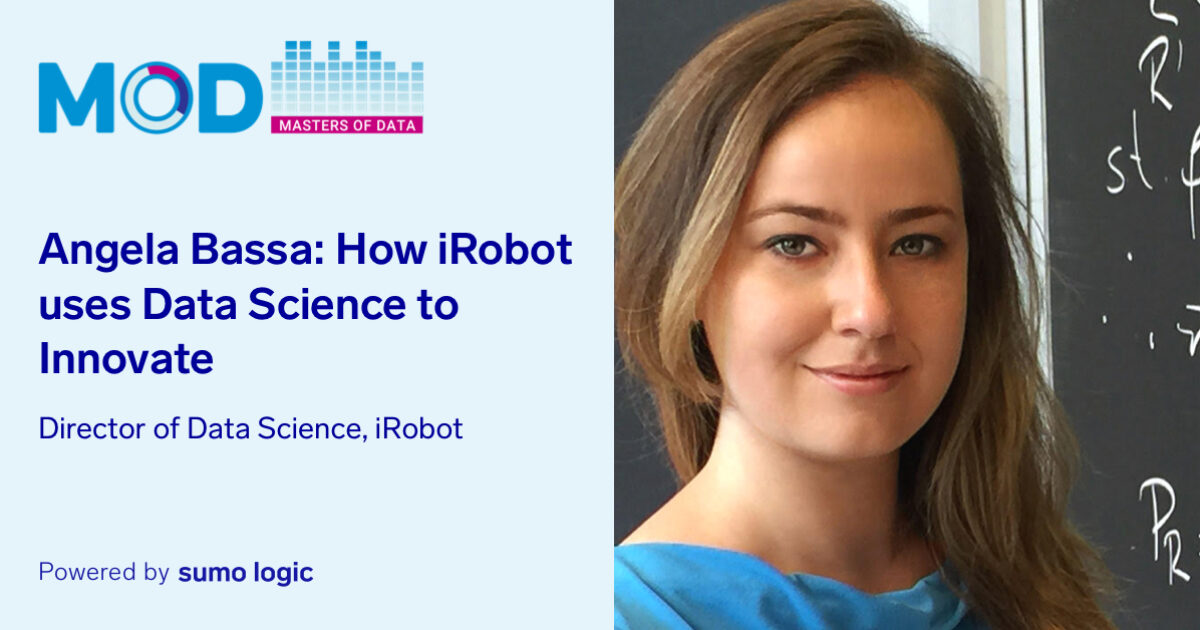Angela Bassa: How iRobot Uses Data Science to Innovate
- by 7wData

Ben: Welcome to the Masters of Data podcast, the podcast where we bring the human to data and I'm your host, Ben Newton. Our guest on this episode, Angela Bassa, hails from one of the most innovative robotics companies on the planet, the aptly named iRobot. The creators of the iconic Roomba vacuum Robot. Angela is the director of data science at iRobot and talks to us about how it recent product announcements [inaudible 00:00:29] more than just product innovation. Their new iRobot 2.0 platform is a new approach to how they build robots, software, and also the place of data science at iRobot. So without any further ado, let's dig in. Welcome everybody to another episode of the masters of data podcast and I am very excited about my guest today. She comes from a company that I've admired for a long time, iRobot. And welcome on to the podcast, Angela, and thank you for coming on.
Angela: Thank you for having me. I'm really excited to share the stuff that we're working on.
Ben: Absolutely and we were talking about some of the exciting stuff that you guys are doing. I'm excited to have you talk about it. Angela Bassa, she's a director of data science at iRobot and so she's obviously got her hands into some really interesting things. Now, how we usually start off Angela, Id love to just take a couple minutes to give everybody a little bit of background on you. How did you end up in data science and how did you end up at iRobot? What's the path that brought you here?
Angela: I think the one thing that makes it a standard path is just how nonstandard it was which is something that's pretty common among practitioners of the data dark arts. I actually came into data science from the math background. There's sort of a dichotomy from people who come into it from the software development side and people who come into it from the math and analytical side and that's where I came from. So, I have a lot to learn in terms of software development and engineering. So, I was an individual contributor way back when, getting my hands dirty with data and understanding the pain of being the person ensuring the validity of the data product that you're working with to know that the outcomes mean what you think they mean. So that's a lesson that I have near and dear to my heart that I try to impart on my teams as well.
I did a lot of work with medical data, clinical trials data, pharmaceutical development data, which branched a little into medical devices, and agricultural, and egg tech for awhile there. Then I transitioned into more marketing territory. That's when I discovered the vast troves of data that are collected about us as we traverse the interwebs. So, that's also when I shut down a lot of my social media presence. Then I have just one channel that I focus on right now that is a little bit easier to control and have a mental model around. And then now I'm mostly useless, I'm management.
Ben: What's that one channel, by the way? Is it MySpace or like what are you?
Angela: Right? Yeah. Tom is my buddy. So I am pretty active on Twitter. There's a strong bit of scientific community on Twitter that if you can block all of the garbage noise it's actually really quite useful.
Ben: All right. Well I'm going to invite you back on to have another podcast about how to block the garbage noise cause I still don't know how to do that. You know it's really interesting. I love hearing people's backgrounds cause now having interviewed quite a few data science people for the podcast in particular the one thing that is common is that their backgrounds are not common. There's a lot of different strands. They came from physics, or they came from mathematic, or they came from computer science. It's somewhat reminiscent of what I've heard about the early days of computer science is that as the field was growing people, almost nobody, there were no computer science programs.
[Social9_Share class=”s9-widget-wrapper”]
Upcoming Events
Shift Difficult Problems Left with Graph Analysis on Streaming Data
29 April 2024
12 PM ET – 1 PM ET
Read MoreYou Might Be Interested In
Does Open Data Really Empower Consumers?
11 Dec, 2016Open data is helping with projects as diverse as city parking, energy use and medical treatments. Can it help your …
The English language is a lot more French than we thought, here’s why
17 Apr, 2017DISCLAIMER: I personally do not have an opinion on the classification of English, I am not a linguist. This article …
How Amaravati can be a True Smart City
29 Oct, 2016Amaravati, the upcoming capital of Andhra Pradesh, is touted to be a major game changer in Indian cities. While it …
Recent Jobs
Do You Want to Share Your Story?
Bring your insights on Data, Visualization, Innovation or Business Agility to our community. Let them learn from your experience.
Privacy Overview
Get the 3 STEPS
To Drive Analytics Adoption
And manage change




